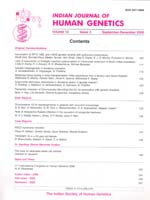
|
Indian Journal of Human Genetics
Medknow Publications on behalf of Indian Society of Human Genetics
ISSN: 0971-6866
EISSN: 0971-6866
Vol. 17, No. 2, 2011, pp. 77-81
|
 Bioline Code: hg11018
Bioline Code: hg11018
Full paper language: English
Document type: Research Article
Document available free of charge
|
|
|
Indian Journal of Human Genetics, Vol. 17, No. 2, 2011, pp. 77-81
| en |
Cytoprotective effect of honey against chromosomal breakage in fanconi anemia patients in vitro
Mogib El-Dahtory, Faeza Abdel. & Yahia, Sohier
Abstract
Background : Natural honey is widely used all over the world as a complementary and alternative medicine in various disorders including Fanconi anemia (FA). FA is a rare genetic chromosomal instability syndrome caused by impairment of DNA repair and reactive oxygen species (ROS) imbalance. This disease is also related to bone marrow failure and cancer. The aim of this study was to evaluate the cytoprotective effect of honey on mitomycin C (MMC-) induced chromosomal damage in peripheral lymphocytes from FA patients.
Materials and Methods :Treatment of these complications with alkylation agents MMC may enhance chromosomal breakage. We have evaluated the effect of honey on MMC- induced chromosomal breakage in FA blood cells using chromosomal breakage assay. The basal chromosomal breakage count was higher among FA patients than healthy subjects.
Results : The addition of MMC alone gave a significantly higher of chromosomal breakage in FA patients than control group (P < 0.0001). Pre- treatment with honey significantly inhibited breakage induced by MMC in FA patients by its antioxidant effect.
Conclusion : Honey can prevent MMC- induced chromosomal breakage by its antioxidant effect.
Keywords
Chromosomal breakage, Fanconi anemia, hony, mitomycin-C
|
| |
© Copyright 2011 Indian Journal of Human Genetics.
Alternative site location: http://www.ijhg.com/
|
|
